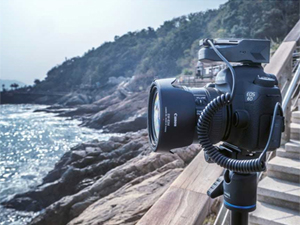



Date:05/02/18
 Not everyone who owns a DSLR is a highly-skilled photographer, yet they do all want their photos to look good. Well, that's why Aurga was created. It's a plug-in module that uses artificial intelligence to adjust the camera's settings, based on a database of professionally-taken photographs.
Not everyone who owns a DSLR is a highly-skilled photographer, yet they do all want their photos to look good. Well, that's why Aurga was created. It's a plug-in module that uses artificial intelligence to adjust the camera's settings, based on a database of professionally-taken photographs.
Similar in concept to the successfully-crowdfunded Arsenal, Aurga slots into the camera's flash mount, and is wirelessly controlled from up to 100 ft (30 m) via an iOS/Android app. Utilizing that app, users can choose between six photo categories, based on the type of shot they're taking – these include things like Portrait, Landscape and Moving Object.
Once a category has been selected, Aurga searches through its database of thousands of photos, analyzing ones that fall into that same category. Taking the existing ambient lighting into account, it then adjusts the camera's settings, based on what was done in those other photos.
If the user is taking a portrait, for example, Aurga will open up the aperture to decrease the depth of field. Should they want light trails in their night-time shots, on the other hand, it will select a slow shutter speed.
The app can also be used for full manual control of the camera, to trigger the shutter remotely, and to get HDR (High Dynamic Range) shots – in the case of the latter, three identically-composed shots are taken at different exposures, and then merged into one composite photo.
Additionally, the module has a memory card slot for backing up photos, supporting up to 256GB. It should be noted, however, that Aurga only works with Nikon and Canon cameras. There's a list of compatible models at the link below.
Aurga is currently the subject of a Kickstarter campaign, where a pledge of US$89 is required to get one. Assuming it reaches production, the retail price will be $130.
Aurga uses AI to run your camera
 Not everyone who owns a DSLR is a highly-skilled photographer, yet they do all want their photos to look good. Well, that's why Aurga was created. It's a plug-in module that uses artificial intelligence to adjust the camera's settings, based on a database of professionally-taken photographs.
Not everyone who owns a DSLR is a highly-skilled photographer, yet they do all want their photos to look good. Well, that's why Aurga was created. It's a plug-in module that uses artificial intelligence to adjust the camera's settings, based on a database of professionally-taken photographs.Similar in concept to the successfully-crowdfunded Arsenal, Aurga slots into the camera's flash mount, and is wirelessly controlled from up to 100 ft (30 m) via an iOS/Android app. Utilizing that app, users can choose between six photo categories, based on the type of shot they're taking – these include things like Portrait, Landscape and Moving Object.
Once a category has been selected, Aurga searches through its database of thousands of photos, analyzing ones that fall into that same category. Taking the existing ambient lighting into account, it then adjusts the camera's settings, based on what was done in those other photos.
If the user is taking a portrait, for example, Aurga will open up the aperture to decrease the depth of field. Should they want light trails in their night-time shots, on the other hand, it will select a slow shutter speed.
The app can also be used for full manual control of the camera, to trigger the shutter remotely, and to get HDR (High Dynamic Range) shots – in the case of the latter, three identically-composed shots are taken at different exposures, and then merged into one composite photo.
Additionally, the module has a memory card slot for backing up photos, supporting up to 256GB. It should be noted, however, that Aurga only works with Nikon and Canon cameras. There's a list of compatible models at the link below.
Aurga is currently the subject of a Kickstarter campaign, where a pledge of US$89 is required to get one. Assuming it reaches production, the retail price will be $130.
Views: 343
©ictnews.az. All rights reserved.Similar news
- Azerbaijani project to monitor disease via mobile phones
- Innovative educational system to be improved under presidential decree
- NTRC prolongs license of two TV and radio organizations for 6 years
- Azerbaijan establishes e-registry for medicines
- Azerbaijani museum introduces e-guide
- Nar Mobile opens “Nar Dunyasi” sales and service center in Siyazan city
- International conference on custom electronic services held in Baku
- OIC secretary general to attend COMSTECH meeting in Baku
- Azerbaijan develops earthquake warning system
- New law to regulate transition to digital broadcasting in Azerbaijan
- Azerbaijani State Social Protection Fund introduces electronic digital signature
- Intellectual traffic management system in Baku to be commissioned in December
- Tax Ministry of Azerbaijan started receiving video-addresses
- World Bank recommends Azerbaijan to speed up e-service introduction in real estate
- Azerbaijan to shift to electronic registration of real estate





















